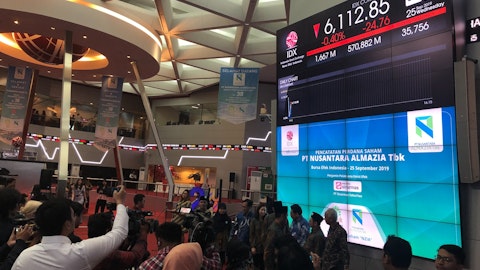Kristine Liwag: Good morning, everyone. Maybe switching gears to a different topic. With tighter cost of capital, we’ve seen valuations come down in high-growth investments. Is this a better time for corporate VC to enter into deals on attractive terms? I mean just looking at the limitations on M&As from the FTC stance that we saw with Aerojet Rocketdyne, I mean how should we think about the importance of Lockheed Martin Ventures to access these new technologies? And could we see ventures double from here?
Jim Taiclet: Kristine, this is Jim. One of the first things I did when I came from the Board to active management was to double, as you said, to double the venture fund, right? So it was $200 million, now it’s $400 million. We’re actively — actually, very actively looking to invest that additional funding. In the great scheme of the company, though, it’s really designed to discover emerging technology that might be applicable to our strategy and to our products and systems and help kind of develop that technology in a way that it can have utilization earlier than perhaps otherwise for our industry. So we get the most benefit out of our venture fund in actual operations, production and development of platforms and systems. We have had a nice upturn in the valuations of those investments as well, but they’re not necessarily driving the ultimate results or the ultimate growth prospect of the company, but they’re indirectly doing just that.
Jay Malave: I’ll just add, Kristine, I mean it’s a great point. I mean we’ve got a pretty tight alignment on the targets that we pursue to our technology road maps. And these are examples like Joint All Domain Operations interoperability, autonomy, artificial intelligence and other areas that will help us drive and accelerate our internal organic capability with these new emerging technologies. And so it’s a great point. There’s certainly opportunity there. As Jim mentioned, we’ve increased our availability of funding for that, and we’re excited about those opportunities.
Operator: And next, we’ll go to Scott Deuschle with Credit Suisse. Please go ahead.
Scott Deuschle: Hey, good morning. Jay, you guys have taken a bit of a different approach on this R&D tax issue than some of your peers. And I know this subject has been beaten to death already, but I’m just curious if you’ve had any recent conversations with the government on whether they’re going to agree with the approach you’ve taken. And then I guess just stepping back more broadly, you had this uncertain tax position disclosed in the 10-Q. Just kind of give us a sense for when you think that might get resolved? Thank you so much.
Jay Malave: Sure. Good question. We remain confident in the position that we’ve taken. We’ve had really no dialogue. We are awaiting guidance from the IRS on what contracts specifically would be covered. You’re right that different players have taken different positions. We remain confident in our position. We believe that the risk is a factor. And when you are under particularly cost-type contracts, there is no risk taken by the provider of those services. Secondly, we believe the benefit is marginal because the owner or the contractor of that work is really the one that takes over that technology and can transfer it to others at any point in time. And so we think that those are sound base and sound arguments supported by legal teams that we have in a position that we’ve taken.





